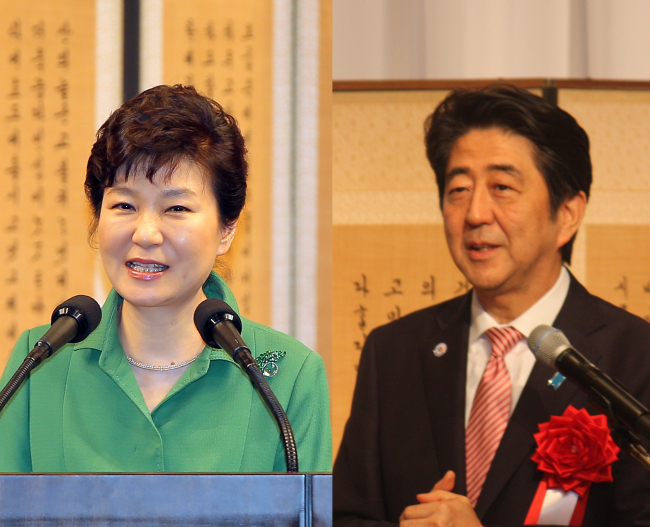Park, Abe stress forward-looking partnership
Two leaders attend anniversary events in each other’s missions
By Korea HeraldPublished : June 22, 2015 - 21:18
The leaders of South Korea and Japan on Monday both called for progress in the two countries’ fraught relations, and a new era of cooperation as they marked the 50th anniversary of the normalization of bilateral ties.
Their remarks, focusing on forging a future-oriented partnership, are expected to create much-needed momentum in improving relations, which have been strained amid escalating historical and territorial feuds.
At a commemorative event arranged by the Japanese Embassy in Seoul to mark the anniversary, South Korean President Park Geun-hye said it was time to “put down the heavy burden of history with the spirits of reconciliation and coexistence.”
“This year, which marks the 50th anniversary of the normalization of bilateral ties, is a historical opportunity. We should make it a turning point for South Korea and Japan to move forward toward a future of new cooperation. This is also our obligation for future generations,” she said.
“Our governments should unite the minds of the two countries, and cooperate on the issues that require bilateral cooperation.”
Their remarks, focusing on forging a future-oriented partnership, are expected to create much-needed momentum in improving relations, which have been strained amid escalating historical and territorial feuds.
At a commemorative event arranged by the Japanese Embassy in Seoul to mark the anniversary, South Korean President Park Geun-hye said it was time to “put down the heavy burden of history with the spirits of reconciliation and coexistence.”
“This year, which marks the 50th anniversary of the normalization of bilateral ties, is a historical opportunity. We should make it a turning point for South Korea and Japan to move forward toward a future of new cooperation. This is also our obligation for future generations,” she said.
“Our governments should unite the minds of the two countries, and cooperate on the issues that require bilateral cooperation.”

Park’s message reflected a subtle change from her earlier tough position that without Japan squarely facing up to history and recognizing its colonial-era atrocities, it could not open a new future and would only face isolation.
Park was also seen to urge her counterpart to use this occasion as an opportunity to make efforts to extend the reconciliatory gesture to mend the differences and move forward, without specifying the thorny issues.
The same message was delivered to an anniversary event arranged in Tokyo by the South Korean Embassy there.
The message was read out by Seoul’s Foreign Minister Yun Byung-se who arrived in Japan Sunday for talks with his counterpart Fumio Kishida and to attend the event.
Japanese Prime Minister Shinzo Abe attended the anniversary event in Tokyo, urging Seoul to open another 50 years of cooperative relations.
“Let’s look back on the 50 years of the development of our friendship, look ahead into the next 50 years and hold our hands together to open a new era,” he said, stressing that South Korea and Japan are the “most important neighbors” to ensure regional peace and stability.
“The two countries cooperating to tackle regional and global tasks, and cooperating globally would lead to an establishment of new bilateral relations. (I) will join forces with President Park Geun-hye (to evolve the relations).”
Reflecting the deterioration in bilateral relations, Park and Abe have yet to hold a summit. They met for a trilateral summit, arranged by U.S. President Barack Obama on the sidelines of the Nuclear Security Summit in The Hague, the Netherlands in March 2014.
Seoul has maintained that “conditions” are not yet ripe for a bilateral summit when the two sides have made little progress in the efforts to address historical issues including Japan’s wartime sexual enslavement of Korean women, euphemistically called “comfort women.”
In recent months, diplomatic tension between Seoul and Tokyo has continued over a series of historical issues including Japan’s bid to put 23 sites of Japan’s Meiji Industrial Revolution on UNESCO World Heritage Sites list.
Yun indicated that, during his talks with the Japanese foreign minister on Sunday, the two sides had almost reached an agreement to present the facts about the use of forced labor at seven of the sites if they are to gain world heritage status.
Seoul has demanded that Tokyo should exclude seven of the sites where around 57,900 Koreans were forced to work during the colonial era, or clearly mention that forced labor was used there. The World Heritage Committee will convene a general session from June 28-July 8 in Bonn, Germany, where its 21 members will make a final decision on the issue.
In the afternoon, Park met with Fukushiro Nukaga, chairman of the Japan-Korea Parliamentarians’ Union, who attended the anniversary event in Seoul as Abe’s special envoy.
During their meeting, Park expressed her hopes that Abe would uphold former Tokyo governments’ positions about history. Abe’s nationalist rhetoric and action have been seen in Korea as him holding a revisionist view of history, which has escalated diplomatic tensions between the two nations.
By Song Sang-ho (sshluck@heraldcorp.com)
-
Articles by Korea Herald


![[Exclusive] Korean military set to ban iPhones over 'security' concerns](http://res.heraldm.com/phpwas/restmb_idxmake.php?idx=644&simg=/content/image/2024/04/23/20240423050599_0.jpg&u=20240423183955)




![[Herald Interview] 'Amid aging population, Korea to invite more young professionals from overseas'](http://res.heraldm.com/phpwas/restmb_idxmake.php?idx=644&simg=/content/image/2024/04/24/20240424050844_0.jpg&u=20240424200058)

![[Pressure points] Leggings in public: Fashion statement or social faux pas?](http://res.heraldm.com/phpwas/restmb_idxmake.php?idx=644&simg=/content/image/2024/04/23/20240423050669_0.jpg&u=)









